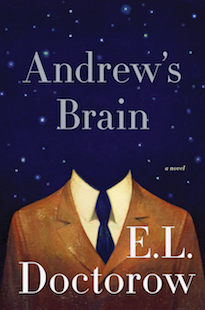Short novel packs in neuroscience, dwarves, tragedy and love
Book review: ‘Andrew’s Brain’, by E.L. Doctorow
Share
By E.L. Doctorow
Laid out like a lazy term paper—triple-spaced with wide margins and in a big font—Andrew’s Brain still barely stretches to 200 pages. But if it’s a short novel, it isn’t necessarily a small one. Doctorow packs a lot in: neuroscience, dwarves, tragedy, love. And by keeping it brief, he also keeps what could have been an over thought premise from sprawling out of control. The end result is a tight riff on grief, doubt and the difference between our brains and our minds. It’s a typically high-concept effort from the author of, among others, Ragtime and Billy Bathgate. And if it isn’t likely to stand with those among his absolute best works, it is still a lively, intriguing read.
Doctorow structures the book as a series of extended therapy sessions. He opens with Andrew, a once-promising cognitive scientist, unspooling his personal tragedies to an unnamed second party. Andrew, the first chapter reveals, accidentally killed his first child—a pharmacist gave him the wrong medicine and he delivered a fatal dose—and his marriage ended as a result. Afterward, he fled to a small college town where he met his next wife. She later died, leaving Andrew with a second baby, which he brought back and gave to his first wife to care for.
None of that spoils the story much. Doctorow lays most of it out in the first paragraph. (“One evening [Andrew] appeared with an infant in his arms at the door of his ex-wife, Martha. Because Briony, his lovely young wife after Martha, had died.”) But the narrative details of Andrew’s Brain are almost secondary. The real question of the book isn’t so much what Andrew says happened as it is how much, as a reader, you’re supposed to believe him. His details are just so unlikely. (Martha’s new husband is a struggling opera star; he wears a costume from Russian tragedy around the house.) And the characters, outside Andrew himself, are barely sketched in. Briony especially exists as young and blond and not much else. Add in some extended noodling about consciousness and cognition, and you have the makings of a deeply, purposefully unreliable narrator.
Still, for all the shaky details, there is a real emotional core to this book. And the climax, when it comes, still hits. It doesn’t feel gimmicky or unearned, which is a credit both to Doctorow’s inventiveness and his empathy as a writer.
